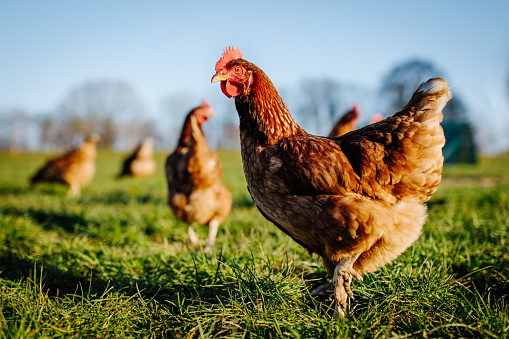Dairy, Poultry and Aqua Farming

branch of agriculture that encompasses the breeding, raising, and utilization of dairy animals, primarily cows, for the production of milk and the various dairy products processed from it.
Cow's milk is a good source of protein and calcium, as well as nutrients including vitamin B12 and iodine. It also contains magnesium, which is important for bone development and muscle function, and whey and casein, which have been found to play a role in lowering blood pressure.
The nutritional profile of milk is impressive.
After all, it’s designed to fully nourish newborn animals.
Just one cup (244 grams) of whole cow’s milk contains (2):
• Calories: 146
• Protein: 8 grams
• Fat: 8 grams
• Calcium: 28% of the RDA
• Vitamin D: 24% of the RDA
• Riboflavin (B2): 26% of the RDA
• Vitamin B12: 18% of the RDA
• Potassium: 10% of the RDA
• Phosphorus: 22% of the RDA
• Selenium: 13% of the RDA
Cow Milk is an excellent source of vitamins and minerals, including “nutrients of concern,” which are under-consumed by many populations .
It provides potassium, B12, calcium and vitamin D, which are lacking in many diets.
Milk is also a good source of vitamin A, magnesium, zinc and thiamine (B1).
Additionally, it’s an excellent source of protein and contains hundreds of different fatty acids, including conjugated linoleic acid (CLA) and omega-3s.
Conjugated linoleic acid and omega-3 fatty acids are linked to many health benefits, including a reduced risk of diabetes and heart disease

Buffalo Milk : The health benefits of milk are plenty. In India, both cow milk and buffalo milk are popular. Both types of milk are known to be beneficial for different reasons. Here are some health benefits of buffalo milk.
Lowers bad cholesterol: Buffalo milk is low in cholesterol and is known to be good for those with high cholesterol and heart conditions. Studies have shown that it also helps in bringing down bad cholesterol or LDL levels.
High in nutrients: Buffalo milk is full of extremely beneficial nutrients like calcium, phosphorous, magnesium and iron which are essential for the proper and healthy growth of bones. Regular consumption of buffalo milk is thus known to keep bone diseases like osteoporosis away. Calcium is known to be the building blocks of bones and this is why drinking buffalo milk regularly can help reduce your risk of arthritis and other bone and joints diseases even later in life.

Chicken: Eating chicken can help to build stronger muscles and promote healthier bones, decreasing the risk of injuries and diseases such as osteoporosis. Research suggests that 25-30 grams of protein per meal can help us feel more full. Chicken has tryptophan, an amino acid that is responsible for raising serotonin levels in your brain. Serotonin is the “feel-good” neurochemical linked with mood. Dark and white meat chicken contains vitamin B12 and choline, which together may promote brain development in children, help the nervous system function properly and aid cognitive performance in older adults.
Egg: Though relatively small in size, eggs pack a lot of nutrition and can be an important staple in a well-balanced diet.

One large boiled egg has about 77 calories and contains:
• Vitamins A, B5, B12, D, E, K, B6
• Folate
• Phosphorus
• Selenium
• Calcium
• Zinc
• Six grams of protein
• Five grams of healthy fats
“Eggs are a good source of protein (both whites/yolk). They also contain heart-healthy unsaturated fats and are a great source of important nutrients, such as vitamin B6, B12 and vitamin D,” says Kurt Hong, MD, an internal medicine specialist at Keck Medicine of USC.
2. Eating cholesterol affects different people, well, differently: Yes, it’s true that eggs — specifically egg yolks — are high in cholesterol. A single large egg has approximately 186 mg of dietary cholesterol. However, before eliminating eggs from the menu, it’s worth investigating the dietary guidelines provided by the U.S. Department of Agriculture (USDA). One study suggests that eggs don’t raise cholesterol at all for about 70% of people. According to the researchers, cholesterol in the diet doesn’t necessarily raise cholesterol in the blood. The remaining 30%, who are called “hyper responders,” can mildly raise total and low-density lipoprotein (LDL) cholesterol by consuming eggs.
“As with any food, the key here is consumption in moderation,” says Hong, who is also a clinical professor of medicine at the Keck School of Medicine of USC.
3. Eggs raise good cholesterol: Eating eggs leads to elevated levels of high-density lipoprotein (HDL), also known as the “good” cholesterol. People who have higher HDL levels have a lower risk of heart disease, stroke and other health issues. According to one study, eating two eggs a day for six weeks increased HDL levels by 10%.
4. Get some choline: Choline is a water-soluble vitamin that is often grouped with the B vitamins. It’s used to build cell membranes and helps produce signaling molecules in the brain. One hard-boiled egg has about 147 mg of choline, which is 27% of the daily value recommended by the U.S. Food and Drug Administration (FDA).
5. Eggs help maintain your eyesight: As we get older, we need to take better care of our eyes. Egg yolks contain large amounts of lutein and zeaxanthin, helpful antioxidants that help reduce the risk of cataracts and macular degeneration in the eyes. Eggs are also high in vitamin A, which is beneficial for eye health.
6. Some eggs are better for you: Omega-3 helps reduce triglycerides, which are a type of lipid fat in the blood. That’s why eating Omega-3 enriched eggs may be an option, particularly if you don’t enjoy other foods (fish, nuts, seeds) that are naturally rich in Omega-3. (If your triglyceride level is below 150, you’re doing well; 150-199 is borderline high; 200-499 is high; and 500 and above is considered very high.)
7. Get enough proteins and amino acids: Getting enough protein in our diets is an important way of helping our body’s health. Each egg contains about six grams of protein, as well as helpful amino acids. Getting our share of protein for the day can help with weight management, increase muscle mass, lower blood pleasure and help our bones, as well.
8. They’re not bad for the heart: Despite what was believed in previous decades, there is no direct link between egg consumption and heart disease or stroke. But some studies show that people with diabetes who eat eggs increase their chance of heart disease. People who follow a low-carbohydrate diet and eat eggs have less of a chance of developing heart disease, some studies suggest.
9. It’s a filling meal: You might have noticed that eating eggs for breakfast may keep you feeling fuller for longer — that’s generally attributed to the high protein content in eggs. Whether you have an omelette for breakfast or a hard-boiled egg as a snack, eggs can help you stay satisfied after or between meals.